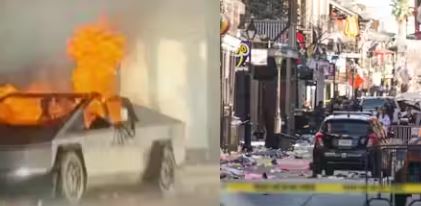The New Orleans and Las Vegas Trump Hotel attacks should both bring to the attention of experts the issue of war veteran’s post-traumatic stress and the connection between military service and extremist ideologies.
Shamsud-Din Jabbar, the New Orleans Assailant, was deployed to Afghanistan from February 2009 to January 2010, and he had worked in various roles in the US Army (including in human resources and IT) before his discharge in 2015.[1] Matthew Alan Livelsberger, the Trump Hotel Las Vegas attacker, was a U.S. Army Master Sergeant, a Special Operations soldier on leave from his base in Germany,[2] who had served in Afghanistan [3].
The two attacks are under investigation, and no connection between them has been established at this stage. Jabbar’s attack is investigated as been inspired by Daesh (which means that even if the FBI quite hastily stated there were no other accomplices, it remains to be seen if the attacker belonged to any offline or online cells). At the same time, the one by Livelsberger seems up too now to have an unclear political motivation, with some general references to grievances due to the political situation in the US and the country’s foreign policy. The radicalisation process of the perpetrators is under the microscope. While it is always difficult to accurately pinpoint the exact step that was decisive for a person to follow the path of violence, in this case we cannot overlook a common element: both men served in Afghanistan, during a war that was a traumatic experience. Regarding Livelsberger, there are clear indications due to writings he has left that he was suffering from post-traumatic stress disorder, which is acknowledged also by FBI[4]. When it comes to Jabbar, while there is no similar official acknowledgment, even a brief look at his relationships history shows that there were signs of a problematic personality and behavior indicating possible psychological trauma. He was facing issues with alcohol and substances, and during his second divorce process, a judge granted Jabbar’s second wife a restraining order mandating him to refrain from threats, physical harm, etc. against her and their children[5].
Veterans suffering from post-traumatic stress should be considered a distinct group of vulnerable individuals to extremist ideologies, an easy prey for terrorist groups, and a very capable operative of terror activity. Both their vulnerability and capability have additional characteristics, tied to the military experience. They have lived a life of discipline, accepting orders (often to kill), under the narratives of “war” and “enemy” that they are not allowed to dispute. Despite the acceptance of certain wars as just in history, and of course the recognition that soldiers are serving their country (and they should be honored for it), there are some parameters not to overlook. Soldiers are part of a war machine that requires them to be dedicated and to keep away critical voices of doubt. Wars need a manichaeistic view of things, with a distorted reality of absolute “good” and “evil” and no grey zones. The vilification of the enemy, often dehumanized, is also part of the process so that killing can be justified and considered necessary. War is par excellence the justification of violence as “the only way” to deal with things. The content of the narrative about who is “good” and who is “evil” may change, but the logic is the same in extremist ideology, rhetoric, and narrative. So, veterans have followed once before the same path of accepting and justifying violence as a solution and being part of a (collective) narrative that is polarising. The war in Afghanistan is an example of such a manichaeistic, polarised look at things, which of course was a response to the 9/11 attack and the subsequent terror campaign by Al-Qaeda and Daesh. It was part of the “war against terrorism”, against the “bad guys”, an attempt to counterterrorism based on the power of military violence.
Ex-servicemen are not only vulnerable to extremist ideologies, but they are also extremely dangerous as they have the expertise to carry out attacks. While other attackers usually must download manuals and search on the internet for the steps to create explosive mechanisms, etc. and they need to train to effectively use weapons, army veterans come with the necessary knowledge and experience. Military service ensures a well-rounded operational ability, that includes psychological readiness, especially a cool composition, during planning and carrying out an attack. When army veterans are influenced by extremist ideologies, the gain for terrorist circles is the maximum they can have. A fully developed “fighting machine” is acting in their name, with the bonus that the attacker’s competencies were cultivated by the state and society that is attacked. On a symbolic level, this is also a failure of the state and society that lose to a terrorist group or network not just any citizen, but one who was once serving in the armed forces, with the duty of supporting and safeguarding them.
The vulnerability of veterans and their susceptibility to violent behavior (that may find expression in terror attacks) is not a discovery. Ancient Greeks in their tragedies have thousands of years ago highlighted the problem. Ajax, Philoctetes, Achilles, and Orestes, are all heroes committing terrible acts of violence and massacres in a manic state of mind, after the end of war[6]. A comprehensive counterterrorism policy must make sure there are also systematic measures taken, addressing the challenges army veterans face, and offering them adequate support. Extremist ideologies and terrorist networks give them a new cause to fight for, a new collective and personal identity when often state and society seem to hypocritically underappreciate and overlook the people who have fought for the country’s defense and security. The active support of army veterans, as well as the monitoring of those who already exhibit signs of dangerous behavior, can make a difference in preventing terrorist violence.
[1] https://www.bbc.com/news/articles/c205ek63433o
[2] https://abcnews.go.com/Politics/cybertruck-explosion-suspect-matthew-livelsberger/story?id=117271048
[3] https://edition.cnn.com/2025/01/02/us/matthew-alan-livelsberger-vegas-cybertruck-explosion/index.html
[4] https://www.bbc.com/news/articles/cp3z0x6yx67o
[5] https://edition.cnn.com/2025/01/01/us/shamsud-din-jabbar-suspect-new-orleans-attack/index.html
[6] And such tragedies are used today by programs supporting army veterans, see indicatively: https://medicine.yale.edu/news/yale-medicine-magazine/article/greek-dramas-lessons-for-veterans/, https://www.vice.com/en/article/how-ancient-greek-tragedies-can-help-veterans-deal-with-ptsd-1016/

